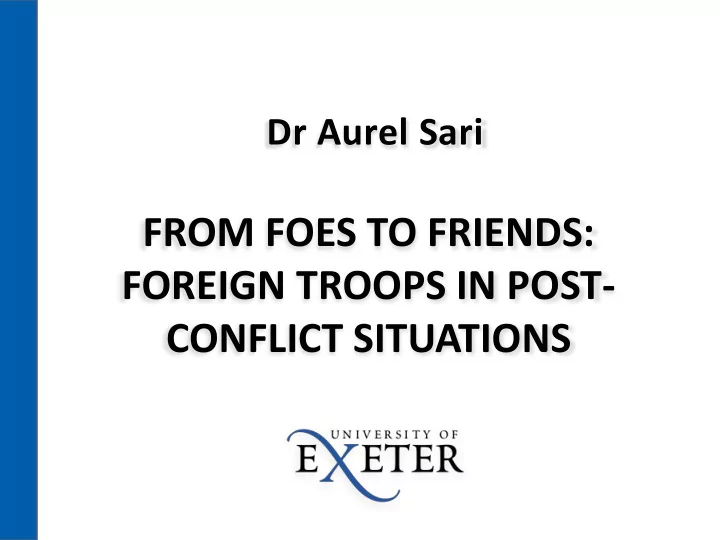

Dr Aurel Sari FROM FOES TO FRIENDS: FOREIGN TROOPS IN POST- CONFLICT SITUATIONS
No Self-contained Status Regime
Status under jus post bellum • is useful to start from the legal status under general international law • problem: there is no self- contained ‘law of visiting forces’
Three examples • State immunity applies, but seems to defer to lex specialis • the content of lex specialis is unclear • the existence of armed conflict may modify the applicability of State immunity
General Principles
Consent to presence and status • principle of territorial sovereignty requires prior consent to presence – consensual presence entails applicability of general rules of international law – non-consensual presence triggers applicability of the law of armed conflict
Respect for local law • foreign armed forces are subject to territorial jurisdiction of the host State – respect for local law recognized in SOFAs – respect for local law also required by law of armed conflict
Exemptions from local jurisdiction • foreign armed forces benefit from various exemptions from local jurisdiction – State immunity – functional immunity – privileges and immunities required by military exigencies
Operational necessity • international practice suggests that status arrangements move on a sliding scale based on operational necessity – functional immunity as a minimum – additional immunities in deployed operations – law of armed conflict as a maximum
Jus dispositivum • status of forces agreements reflect custom and may have contributed to it • however, nothing prevents State to depart from custom • status of forces agreements inject dynamism
Principles of Jus Post Bellum
The concept of jus post bellum • three different paradigms of jus post bellum possible – self-contained regime – area of legal practice – normative framework
Distinct values and considerations • jus post bellum emphasizes certain values: – general values: accountability, proportionality, criminal responsibility and good governance – distinct values: reconciliation, rebuilding, restitution and stewardship • jus post bellum as a law of transition
Presence and Status under Jus Post Bellum
Certain challenges • typically no clean end to hostilities • end of hostilities is not enough, consent is required • consent can be problematic • international mandates may complicate matters
Kosovo • MTA (1999) calls for SOFA between KFOR and FRY • KFOR status regulated unilaterally by UNMIK • unclear whether Resolution 1244 – authorizes UNMIK to do this – extinguishes KFOR’s duty to negotiate SOFA
Iraq • US seeks to conclude SOFA before handover • revised CPA Order 17 regulates status unilaterally, but refers to Security Council Resolutions • status effectively based on – Iraqi consent – Security Council authorization – law of belligerent occupation
Balancing Competing Interests under the Jus Post Bellum
The Lozano case • unusual set of circumstances: status to be resolved under customary international law • US enjoys exclusive jurisdiction over Lozano: – legal context changed from armed conflict to ‘warfare or quasi - warfare’ – principle of the ‘law of the flag’ applies in all of these situations
Status under jus post bellum • Lozano case supports the idea of a sliding scale, but draws distinction in the wrong place • neither complete exemptions nor reciprocity are appropriate for post-conflict situations if applied at the wrong time • UN Model SOFA draws appropriate overall balance
Conclusion
A law of transition • two distinct considerations apply – changes in legal basis of presence affects status – jurisdictional balance must reflect distinct features of transition from conflict to peace • requires a dynamic and contextual approach – status must reflect operational context – States must adjust their expectations and work towards transition
Recommend
More recommend